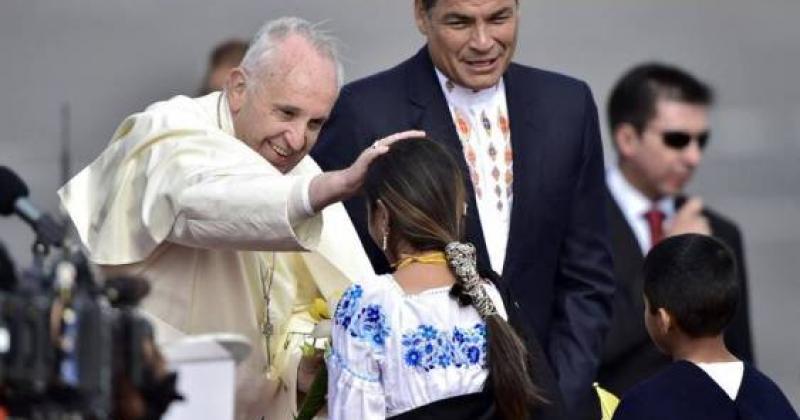Upon his arrival in Quito, Francis called for “differences” to be appreciated and participation without exclusion to be endorsed, in order to ensure “the steps forward in the direction of progress and development guarantee a better future for everyone”. But he also sent a message to the Church, calling for it to help the poor more
“I thank God for making this return to Latin America possible... I have visited Ecuador on a number of occasions for pastoral reasons; thus, today too, I come as a witness of God’s mercy and of the faith in Jesus Christ”. Francis smiled to faithful who welcomed him at Quito airport after the long 13-hour papal flight: the welcome ceremony is the first leg of Francis’ Latin American voyage, which has brought him to Ecuador and will take him to Bolivia and Paraguay. The sky is cloudy and a strong gust of wind blew off Francis' zucchetto as he disembarked the Alitalia Airbus that brought him to Quito. As with his first European trips, Francis chose to start his Latin American tour with visits to the more peripheral nations, rather than the greater ones. He has chosen to go to those countries which are most in need of encouragement along their paths of change and development.
The Pope thanked President Rafael Correa for the “congruity” of his thoughts with his own. In his speech, he recalled the steps the country has taken towards renewal, quoting the Apostolic Exhortation “Evangelii Gaudium” and the “Laudato Si’” encyclical, speaking about “Latin America’s great social sin, which is that of injustice”. He also stated that “the fair distribution of wealth must be demanded”. The Pope congratulated Correa “on the accomplishment” of his mission. A mission which is by no means easy for a left-wing head of state who has criticised the gender ideology, is proposing the establishment of an international body for environmental justice and is implementing social inclusion policies. And who aims to introduce two laws on capital gains tax and inheritance, a sort of “property tax” that is contested both by rich property owners and by the middle class which fears it will lose properties purchased for their children. Correa’s opponents are launching demonstrations all around the country but have stated that they do not intend to disturb the papal visit.
In his first address, Francis recalled the contribution of the Christian faith in shaping the identity of the Ecuadorian people. “Today,” Francis said, “we too can find the keys to dealing with today’s challenges, in the Gospel, appreciating differences, fostering dialogue and participation without exclusion, so that the steps forward in the direction of progress and development guarantee a better future for everyone, with particular regard for our more vulnerable brothers and sisters and minorities.” With regard to this, Francis told Rafael Correa: “Mr. President you can always count on the commitments and co-operation of the Church”. Words which send out a clear message to the Church in Ecuador. An expression of support and co-operation, therefore, to the inclusive policies of a country where 12% of families controls over 90% of companies. A country that is marching towards greater social justice; the rate of absolute poverty dropped from 40% to 20% between 1999 and 2010 and today Ecuador is Latin America’s eighth biggest economy.
Francis ended his speech by recalling that Ecuador in home to “the point that is closest to outer space”, Chimborazo. Chimborazo is the highest peak near the equator in the Ecuadorian Andes and as such is the mountain that is farthest away from the Earth’s centre. For this reason, it is referred to as the place that is “closest to the sun, the moon and the stars”. The Pope added: “As Christians, we compare Jesus Christ to the sun and the moon to the Church, the community; no one else but Jesus shines of His own light. May the coming days make all of us ever more clearly aware of how close is the sun which 'dawns upon us from on high'. May each of us be a true reflection of His light and His love". A passage which refers to an image presented by the Fathers of the Church, quoted by the then Cardinal Bergoglio in his address prior to the Conclave that elected him Pope, in which he urged the Church to overcome self-referentialism.
“It is from here that I wish to embrace all Ecuador,” Francis concluded. “From the summit of Chimborazo, to the Pacific coast; from the Amazon forest to the Galapagos islands; never lose the ability to give thanks to God for what he did and continues to do for you; the ability to defend the small and the simple, to take care of your children and the elderly, to have faith in the young and to contemplate the nobility of your people and unique beauty of your country with awe.”
